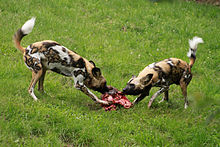Lycaon (genus)
| Lycaon Temporal range: Early Pleistocene – present | |
|---|---|
 | |
| African wild dogs | |
| Scientific classification | |
| Domain: | Eukaryota |
| Kingdom: | Animalia |
| Phylum: | Chordata |
| Class: | Mammalia |
| Order: | Carnivora |
| Family: | Canidae |
| Subfamily: | Caninae |
| Tribe: | Canini |
| Genus: | Lycaon Brookes, 1827 |
| Species | |
| |
Lycaon is a genus of canid which includes the African wild dog (Lycaon pictus) and the extinct species Lycaon sekowei and Lycaon magnus.
Taxonomy[edit]
This hypercarnivorous and highly cursorial genus is distinguished by accessory cusps on the premolars. It branched from the wolflike canids lineage during the Plio-Pleistocene. Since then, Lycaon has become lighter and tetradactyl, but has remained hypercarnivorous. Lycaon sekowei is known from the early Pleistocene epoch of South Africa and was less cursorial.[1]
Some researchers consider the extinct Canis subgenus Xenocyon as ancestral to both Lycaon and Cuon.[2][3]: p149
Other researchers propose that the extinct Canis (Xenocyon) falconeri and Canis (Xenocyon) lycaonoides should be classified under genus Lycaon, to give the descent of three chronospecies: L. falconeri in the Late Pliocene of Eurasia → L. lycaonoides in the Early Pleistocene and the beginning of the Middle Pleistocene of Eurasia and Africa → L. pictus in the Middle–Late Pleistocene and today the extant African descendant.[4]
See also[edit]
- Lycaon of Arcadia, a figure from Greek mythology who was transformed into a wolf
References[edit]
- ^ Hartstone-Rose, A.; Werdelin, L.; De Ruiter, D. J.; Berger, L. R.; Churchill, S. E. (2010). "The Plio-Pleistocene Ancestor of Wild Dogs, Lycaon sekowei n. sp". Journal of Paleontology. 84 (2): 299–308. doi:10.1666/09-124.1. S2CID 85585759.
- ^ Cherin, Marco; Bertè, Davide F.; Rook, Lorenzo; Sardella, Raffaele (2013). "Re-Defining Canis etruscus (Canidae, Mammalia): A New Look into the Evolutionary History of Early Pleistocene Dogs Resulting from the Outstanding Fossil Record from Pantalla (Italy)". Journal of Mammalian Evolution. 21: 95–110. doi:10.1007/s10914-013-9227-4. S2CID 17083040.
- ^ Wang, Xiaoming; Tedford, Richard H.; Dogs: Their Fossil Relatives and Evolutionary History. New York: Columbia University Press, 2008.
- ^ Martínez-Navarro, B. & L. Rook (2003). "Gradual evolution in the African hunting dog lineage: systematic implications". Comptes Rendus Palevol. 2 (#8): 695–702. doi:10.1016/j.crpv.2003.06.002.


 French
French Deutsch
Deutsch